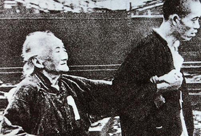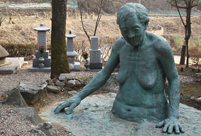 Fighters of Lanzhou MAC in confrontation training
Fighters of Lanzhou MAC in confrontation training
 3D printing to trigger third industrial revolution
3D printing to trigger third industrial revolution
 Top 10 brands that win rich women's hearts
Top 10 brands that win rich women's hearts
 Deng Xiaoping: 'I have a clear conscience all my life'
Deng Xiaoping: 'I have a clear conscience all my life'
 Xi Jinping: 'The people are our strength'
Xi Jinping: 'The people are our strength'
 Amazing cliff diving in cold winter
Amazing cliff diving in cold winter
 Enjoy Sochi 2014 in slow motion
Enjoy Sochi 2014 in slow motion
 University student sentenced to death for poisoning roommate
University student sentenced to death for poisoning roommate
 Chinese lunar New Year celebrated in San Francisco
Chinese lunar New Year celebrated in San Francisco
BEIJING, March 5 -- Chinese Premier Li Keqiang "declared war" against pollution on Wednesday and pledged to fight it with the same determination the country battled poverty, as choking smog has become major environmental and health concerns.
The government will take strong measures to prevent and control pollution with the focus on mega cities and regions with frequent occurrence of smog, Li told lawmakers in his first government work report at the annual session of the National People's Congress.
Smog is affecting larger parts of China and environmental pollution has become a major problem, which is nature's red-light warning against the model of inefficient and blind development, Li said.
He said the government will start by reducing emissions of PM10 and PM2.5, particulate matters in air smaller than 10 and 2.5 micrometers respectively, which are believed to be hazardous to health and major contributors to smog.
A total of 50,000 small coal-fired furnaces will be shut down this year and cleaning technologies, including desulphurization, denitrification and dust removal, will be introduced at coal-burning power plants, according to Li's report.
Six million old high-emission vehicles will be removed from the roads, and cleaner diesel fuel for vehicles will be provided nationwide this year, Li said.
The government will also implement a clean water action plan, strengthen the protection of drinking water sources, prevent and control water pollution in key river basins, and carry out land restoration.
LETTER OF COMMITMENT
Miao Xuegang, an NPC deputy and head of the environmental protection department of east China's Anhui Province, said that Li's declaration is "a letter of commitment from the government."
Ai Nanshan, a professor at Sichuan University in southwest China's Chengdu City, said the government shoulders a major responsibility in dealing with pollution.
"You can not get a beautiful GDP figure at the cost of environment," said Ai, a researcher of environment studies.
Local officials will have no desire to tackle pollution if gross domestic product (GDP) remains a solely important element in the evaluation of their performance, Ai said.
Zhang Wenxin, deputy head of Xinbin county of northeast China's Liaoning Province, said an effective official assessment mechanism should be established to encourage local officials to put more efforts in environmental protection.
Zhang is in charge of environmental protection affairs of the autonomous county of ethnic Man.
A document issued by the Organization Department of the Communist Party of China Central Committee in December vowed sweeping changes in officials' performance assessment mechanism.
It laid out a plan to add environmental and social aspects to officials' assessment. It put a greater emphasis on balanced and sustainable economic development in the hope of making officials think twice before embarking on projects that may devastate environment.
There has been an increasing call that the growth-at-all-costs economic model, which has tainted China's air, water and soil, must come to an end.
The State Council, China's cabinet, issued the Air Pollution Prevention and Control Action Plan in September last year to control PM2.5.
The action plan requires PM2.5 in populated regions and metropolises to be reduced significantly by 2017. At least 15 provincial governments have promised "marked improvement" in air quality in five years.
Among them, Beijing plans to throw 760 billion yuan (124 billion U.S. dollars) into these efforts. Its neighboring province of Hebei has vowed to depose any official that allows more steel or cement production than a mandated quota.
Shanghai has also proposed better coordination with provinces on the Yangtze Delta in work to reduce emissions.
"The war against pollution demands concerted efforts from departments of environmental protection, planning, forestry and law enforcement," said Miao, the NPC deputy from Anhui.
"The public should also make their own contribution," he said.
The "war against pollution" also provides an opportunity for the development of green economy that can both reduce emissions and create employment and tax revenues.
Li said in his report that China will speed up the development and use of energy-efficient and environmentally friendly technologies and products and turn energy conservation and environmental protection into dynamic sunrise industries.
Yang Bin, an environmental protection advocator, called for the government to offer preferential taxation and financing policies to green businesses to boost their incentive to invest and make the environmental industry a sustainable business.
 Chaihe village, pure and peaceful fairyland in snow
Chaihe village, pure and peaceful fairyland in snow Belgians warmly welcome arrival of China's giant pandas
Belgians warmly welcome arrival of China's giant pandas Female marines receive tactical training in NW China
Female marines receive tactical training in NW China Blood memory: Nanjing Massacre in 1937
Blood memory: Nanjing Massacre in 1937 Top 10 pure beauties in showbiz
Top 10 pure beauties in showbiz British WWII veteran: I can't forgive Japan
British WWII veteran: I can't forgive Japan Tongban's dream of prosperity
Tongban's dream of prosperity Chinese frigate Yancheng holds drills in Mediterranean Sea
Chinese frigate Yancheng holds drills in Mediterranean Sea A visit to comfort woman's home in South Korea
A visit to comfort woman's home in South Korea Fairyland? Qingdao in sea of clouds
Fairyland? Qingdao in sea of clouds Top 10 most handsome faces in Asia in 2013
Top 10 most handsome faces in Asia in 2013 Female celebs with beautiful long legs
Female celebs with beautiful long legs Cat 'guardians' in Forbidden City
Cat 'guardians' in Forbidden City Large numbers of ancient coins excavated in Inner Mongolia
Large numbers of ancient coins excavated in Inner Mongolia Leisurely life beneath Zhonggulou, where time travels slower
Leisurely life beneath Zhonggulou, where time travels slowerDay|Week|Month